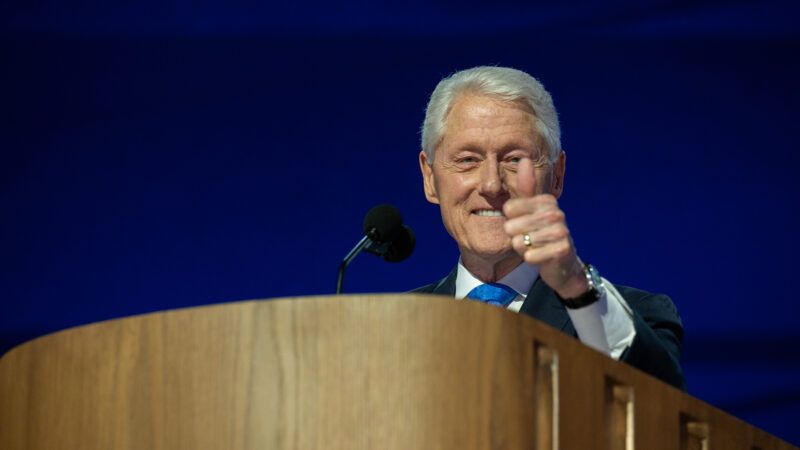Presidents Don't Create Jobs, No Matter What Bill Clinton Said
Dynamic economies operate independently of the political party of whoever was elected most recently.

During his Wednesday night speech at the Democratic National Convention (DNC), former President Bill Clinton trotted out some impressive statistics to make the case that Democrats in the White House are good for the economy.
"You're going to have a hard time believing this, but so help me, I triple-checked it," Clinton said. "Since the end of the Cold War in 1989, America has created about 51 million new jobs….What's the score? Democrats 50, Republicans one"—meaning 50 million new jobs created under Democratic presidents, 1 million under Republican presidents.
But it's misleading to suggest that the president—and by extension, the major political party to which the president belongs—is singularly or even primarily responsible for the success or failure of the job market. Rather, individuals in dynamic economies operate independently of the political party that happens to occupy the White House.
Clinton's numbers are technically right: According to the U.S. Bureau of Labor Statistics, the economy added 2.63 million nonfarm private sector jobs while George H.W. Bush was president. During Clinton's two terms, the economy added 22.9 million jobs. Only 1.37 million jobs were added during George W. Bush's terms, with another 11.57 million during Barack Obama's tenure. During Donald Trump's single term, the economy lost 2.72 million jobs, and in Joe Biden's term through July 2024, the economy has added 15.81 million.
In total, that equals 51.56 million net jobs added since January 1989—50.28 million under Democratic presidents and 1.28 million under Republican presidents. That's not the whole story, though.
Many of the presidents' terms coincided with substantial external forces. Trump left office during a recession caused by the COVID-19 pandemic: In his first three years in office, the economy actually added 6.4 million jobs. Similarly, George W. Bush left office amid the Great Recession, during which the economy shed nearly 7.4 million jobs. Calculating Bush's term up to December 2007, the economy added 5.7 million jobs.
On the other hand, Clinton served during the dot-com boom. The tech-heavy Nasdaq composite more than doubled between January 1999 and March 2000. But then the bubble burst: The economy entered a recession in March 2001, just weeks after Clinton left office, and the Nasdaq would lose 78 percent of its value between its March 2000 high and October 2002.
"There is an avalanche of caveats that apply here, certainly," writes Philip Bump at The Washington Post. "One is that 'increase in people working' is not fully equivalent to 'jobs created,' nor is it necessarily a measure of the policies or administration of the presidents."
Kennesaw State University economics professor J.C. Bradbury argued on X that "income, output, or growth" are more important aspects of "economic well-being." Software engineer Matt Shapiro added, "Since 1995, the number of jobs created and which party was in control of the house of representatives? What's the score? Republicans 32, Democrats negative 2."
In six of Clinton's eight years in office, Republicans controlled the House—do they deserve credit for job creation? Since Democrats controlled the House during Trump's final year in office, which saw the economy shed 20.5 million jobs in a single month at the outset of the pandemic, do they deserve a share of the blame?
National economies—particularly those as large and complex as ours—are dynamic, with an infinite number of inputs and externalities. "Month-to-month job creation is just a function of the dynamic U.S. economy that's bigger than one person," Chris Douglas, associate economics professor at the University of Michigan–Flint, told Marketplace in 2022. Central planning fails for this reason: Dynamic economies are driven by individuals, each operating only with his or her own knowledge and interests in mind.
It makes sense why Clinton would use these numbers to make his case. (He used a very similar argument in his 2012 DNC speech.) Trump is also no stranger to boasting about job gains during his term, including during the pandemic, and even claimed jobs added before he took office.
But in either case, it's misleading for a political party to take all the credit for positive job gains just because its guy was in office. Luckily for us all, the economy chugs along independently of who's in the White House at any given moment in time.


Show Comments (40)